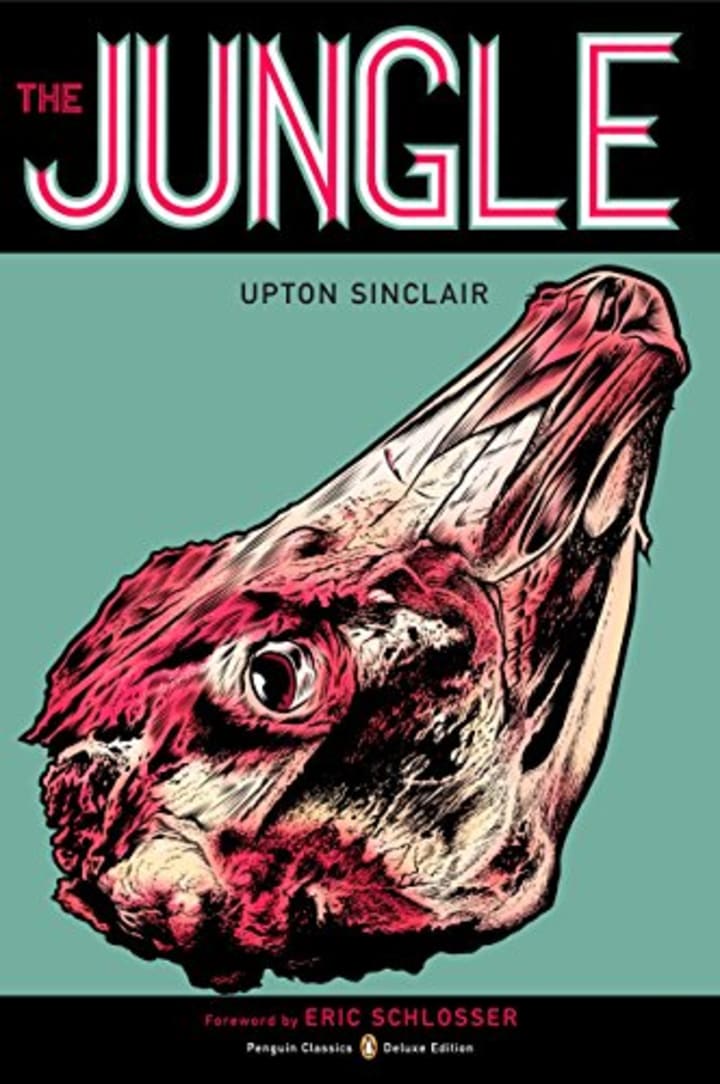The Jungle
“...and the wild beast rose up within him and screamed, as it had screamed in the Jungle from the dawn of time.”

All human beings have their limits. The labor and civil rights we have in the United States were not freely given by any means. There was no sudden realization that workers deserved safety and pay. This epiphany was borne of violence, inflicted onto the many by the few, and some semblance of autonomy was wrenched back from the hands of those that looked down onto the world and saw no humanity, only beings to exploit. My grandfather used to tell my mother, "No one is born free. Freedom isn't free." As grim a thing as it is to say to a child, history has shown us over and over again that the sentiment rings true.

I was fifteen and skimming my brother's overflowing bookshelves. He and his girlfriend would often collect books from secondhand and thrift stores, and had accrued a diverse array of literature over the years. The spine of a paperback caught my eye as the title font reminded me of Jurassic Park. I pulled the book from the shelf, and was greeted by a skinless, earless cow head, its glossy eye still full of life. I could nearly hear it breathe as I stared back, the blue-green background reminiscent of medical scrubs. Something that should evoke pristine hygiene and masterful skills. And yet, as I began to skim the pages, it became clear that that calm color was a facade. I was transported into the cold, grisly, and disgusting world of factory meat packing at the turn of 20th century America. It was a part of history I had never considered before, and I was horrified. Men who worked the killing floor were losing limbs and lives or contracting deadly bacterial infections from the deeply unsanitary conditions and sick animals they were in close contact with for over ten hours a day. Children who participated in clean up and packaging lost fingers, ears, and noses to gangrene brought on by walking to and from work in Chicago winters. I will always remember the vivid descriptions of the workers wading in blood and viscera up to their ankles for their entire shifts. This was a time of mass industrialization beyond anything the world had seen. Mechanization, agriculture, urbanization had all led to population booms. Populations of worker ants meant to be thrown into the proverbial meat grinder and churned out, squeezed dry and unrecognizable. All for the profit gains of the few.
In social studies at school, we had just begun our unit on labor rights in the United States, as well as monopoly busting and industry regulation. Our teacher stressed the importance of journalists and writers at this point in history. Their bravery and ability to share the truth with others swayed even the likes of President Theodore Roosevelt, who after reading Sinclair's The Jungle in 1906, signed the Meat Inspection Act. He had been so moved by the narrative that Sinclair weaved (which, while filled with fictional characters, could have passed as creative non-fiction for the amount of research and dedication he himself put into this investigative work) that he ordered thorough inspections be done in the slaughterhouses of the meat packing district in Chicago. Sinclair had, unfortunately, not exaggerated a single thing.
This book changed me in many ways. First, I was given a first-hand look at just exactly how awful factory work had been before any type of real regulations had been placed on corporations. You're always told "It's terrible", but to be given so many details and to peer into the agony of it all is jarring and sticks with you. Secondly, it kicked off my changing political beliefs, which I continue to hold strongly today. We have so much to thank workers and activists of the past (and the present) for. As Labor Day approaches us, I am reminded of that even more so. And thirdly, it showed me the power of the written word. Upton Sinclair poured his heart, his soul, his anger, and his compassion into this work. It resounded throughout all socio-economic classes of the United States and beyond. It showed me that as a writer, I should never refrain from showing that kind of passion and strong narrative voice within my work. I never know who may be reading and may need to hear what I have to say. Sinclair saw the plight of his fellow men and decided to help in the most meaningful and compelling way that he could: he put pen to paper.
About the Creator
S. C. Almanzar
I am a graduate student studying anthropology and have been writing creatively for almost 20 years. I love new takes on alternative history, especially when there are fantasy or supernatural elements included.
Enjoyed the story? Support the Creator.
Subscribe for free to receive all their stories in your feed. You could also pledge your support or give them a one-off tip, letting them know you appreciate their work.






Comments
There are no comments for this story
Be the first to respond and start the conversation.